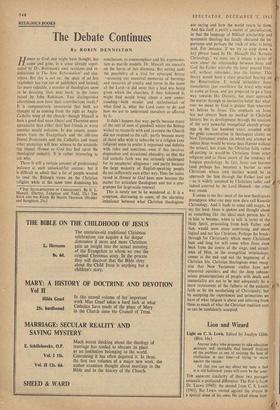RELIGIOUS BOOKS
The Debate Continues
By ROBIN DENNISTON
Honest to God, one might have thought, has come and gone, in a sense already super- seded by Dr. Robinson's own revisions and re- definitions in The New Reformation? and else- where. But this is not so: the spate of ad hoc rejoinders has run out of publishers and instead, far more valuably, a number of theologians seem to be devoting 'their next book' to the issues raised by John Robinson. Two distinguished churchmen now have their contributions ready.* It is comparatively immaterial that both are thought of as coming from the right or Anglo- Catholic wing of the church—though Mascall is here a good deal more liberal and Thornton more speculative than either their best friends or worst enemies would welcome. In due course, assess- ments from the Evangelicals and the old-time liberal Protestants and the Catholics and many other groupings will bear witness to the astonish- ing impact Honest to God has had upon the theological industry. It is rather interesting to ask why.
There is still a certain amount of professional jealousy at such unlooked-for success: but it is difficult to admit that a lot of people wanted to read the Bishop's views on the Christian religion while at the same time dismissing his
. * THE SECULARISATION OF CHRISTIANITY. By E. L. Mascall. (Darton, Longman and Todd, 32s.) THE ROCK AND THE RIVER. By Martin Thornton. (Hodder and Stoughton, 21s.)
conclusions as commonplace and his argumenta- tion as puerile muddle. Dr. Mascall sits uneasily on the horns of this dilemma. But setting aside the possibility of a trial for episcopal heresy —arousing our ancestral memories of burnings and centuries of cruelty and terror in the name of the Lord—it did seem that a lead was being given which the churches, if they followed it, might find would bring about a new under- standing—both secular and ecclesiastical—of what God is, what the Lord came to do and how we are to understand ourselves as affected by it.
It didn't happen that way, partly because many of the sort of men of goodwill whom the Bishop wished to reconcile with and re-create the Church did not respond to the call: partly because many of those who wish to subscribe to a religion (any religion) seem to prefer it organised and definite with rules and sanctions, even if this involves dogmatism and occasional absurdity, so that the full catholic faith was not seriously challenged for its neophytes' allegiance: and partly because the large majority of English-speaking people do not sufficiently care either way. Thus the issues raised in Honest to God have now become the matter for articulate theologians and not a pro- gramme for large-scale renewal.
This is surely not to be wondered at. It is a symptom, distressing to some, of the alarming imbalance between what Christian theologians are saying and how the world reacts to them. And this itself is partly a matter of specialisation, in that the language of Biblical scholarship and systematic theology has fatally obscured the im-
portance and perhaps the truth of what is being said. For instance, if we try to strip down a key phrase (used by Dr. Mascall) like `Kenotic Christology,' we must say it means a point of view about the relationship between Jesus and God the Father whereby the latter poured Him- self, without remainder, into the former. This theory would have a close practical bearing on the Resurrection. It would intimidate those monotheists (par excellence the Jews) who want to come at Jesus, and are prepared to go a long way towards His Divinity, but must approach the matter through an instinctive belief that what- ever we mean by God is greater than whatever we believe by Jesus. The emphasis on Jesus has not always been so marked in Christian history, but its development through the suasions of the very powerful evangelical church group- ings in the last hundred years, coupled with the great concentration in theological circles on New Testament studies (in which any attempt to reduce Jesus would be worse than Hamlet without the prince), has made the Christian faith rather off-putting to would-be Christians from other religions and to those aware of the tendency of Jungian psychology. In fact, Jesus can become (and perhaps has become) a barrier to new Christians whose own instinct would be to approach the Son through the Father and not —as is widely assumed by Christians today and ,t) indeed asserted by the Lord Himself—the other way round.
It seems to me that most of the new theologians presuppose what one may now dare call Kenotic Christology. And it leads to some odd usages, to say the least. Jesus is spoken and thought about as something like the ideal each person has it in him to become, when to talk in terms of the Holy Spirit, proceeding from both Father and Son, would seem more convincing and more logical and not less Christian. Perhaps the break- through for Christianity which many Christians look and long for will come when Jesus steps back from the centre of the stage, and accept- ance of Him, in the evangelical terminology, comes at the end and not the beginning of a Christian life. Christian theologians must recog- nise that New Testament studies have not interested outsiders and that the deep subcon- scious preoccupations of people with death and immortality are not to be met adequately by a mere restatement of the fullness of the catholic faith or by the secularising of Christianity, but by accepting the experiences and intimations we have of what religion is about and inferring from these as much of what the Christian tradition says as can be confidently accepted.






































 Previous page
Previous page